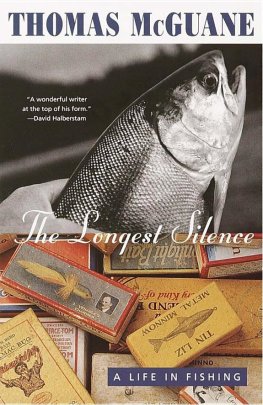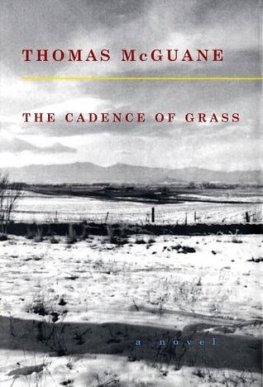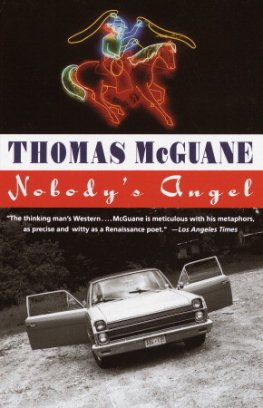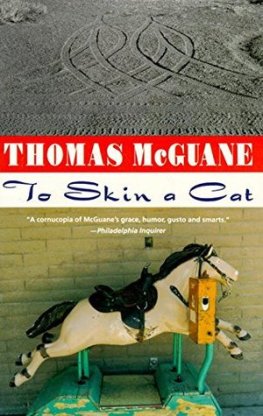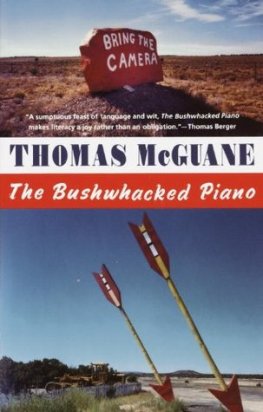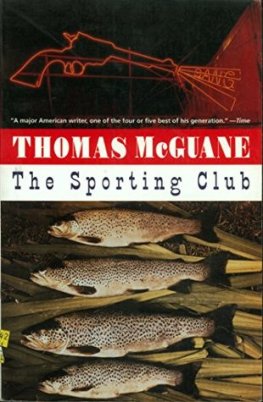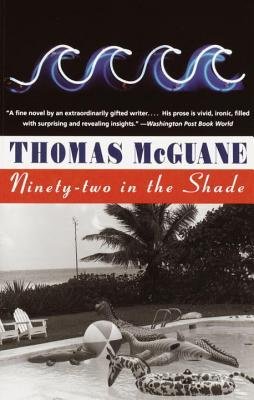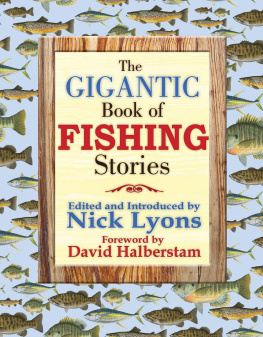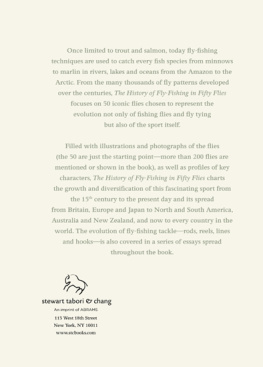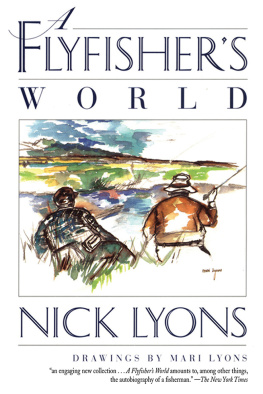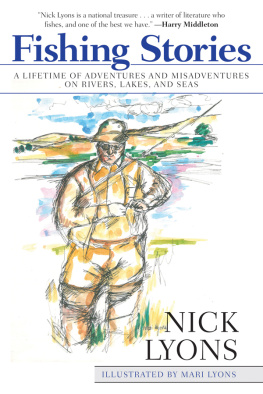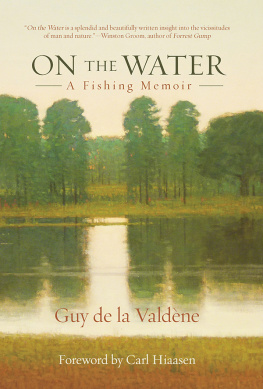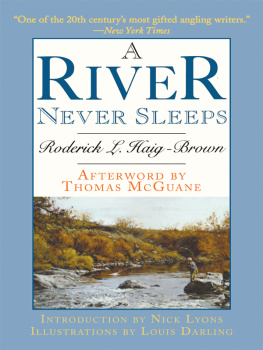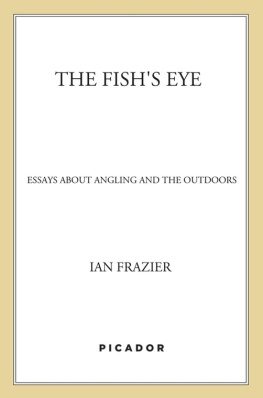Thomas Mcguane
The Longest Silence
The sport of angling used to be a genteel business, at least in the world of ideals, a world of ladies and gentlemen. These have been replaced by a new set of paradigms: the bum, the addict, and the maniac. Im afraid that this says much about the times we live in. The fisherman now is one who defies society, who rips lips, who drains the pool, who takes no prisoners, who is not to be confused with the sissy with the creel and the bamboo rod. Granted, he releases that which he catches, but in some cases, he strips the quarry of its perilous soul before tossing it back in the water. What was once a trout cold, hard, spotted, and beautiful becomes number seven. Perhaps hes the winning run in the one-fly contest, or the fish that put the Czechoslovakians across the finish line ahead of the Americans in the world championship of fly-fishing.
Angling is a situation whose dramatic values are immediately charged by their context. The angler who, to the envy of his peers, has gone fishin in that mythic sense that implies a non-return, soon finds himself alone in a leaden state of malaise and ennui. The spectacle of the angler gone native that is in the miraculous event that he hasnt staved off a coma by giving up fishing is a study in torpor at close range, practically in laboratory conditions.
Many fishing books by what are known as experts seem filled with the longueurs and repetitions that incite the clever reader to cry, Get a life! Worst of all are the lamentations of the angler who has given himself entirely to the sport and feels that sportsmen up for the week or the season or the run only to return to jobs and family dont understand him.
Im afraid that the best angling is always a respite from burden. Good anglers should lead useful lives, and useful lives are marked by struggle, and difficulty, and even pain. Perhaps the agony of simple mortality should be enough. But probably it is not. As they say in South America, everyone knows that they are going to die; yet nobody believes it. Human lapses of this kind enable us to fish, fornicate, overeat, and bet on the horses.
Therefore, bow your back and fish when you can. When you get to the water you will be renewed. Leave as much behind as possible. Those motives to screw your boss or employees, cheat on your spouse, rob the state, or humiliate your companions will not serve you well if you expect to be restored in the eyes of God, fish, and the river, which will reward you with hollow waste if you dont behave. You may be cursed. You may be shriven. You may be drowned. At the very least, you may snap off your fly in the bushes.
We like to think of the idea of selective trout; it serves our anthropocentricity to believe that we are in a duel of wits with a fish, a sporting proposition. We would do well to understand that trout and other game fish are entirely lacking in sporting instincts. They would prefer to dine unmolested and without being eaten themselves.
In my view, a trout that is feeding selectively is doing the following: having ascertained that many of the objects going by his view are edible, he decides which ones he can eat efficiently and which will do him the most good. Then, in the interest of energy conservation, and if the chosen food item is in sufficient quantity, the trout gradually transfers the decision-making process to something like muscle memory, to thoughtless routine. If the fly we cast fails to trigger that recognition or is not in the rhythm in which the trout is feeding, we get a no-sale. The base of difficulty from the anglers point of view is the quantity of food items appearing before the trout. If he can key in and fill up, the angler may have a problem. That is why, even though it is full of fish, a bug soup like the Henrys Fork has brought so many to tears or aged them prematurely. It is also why one or two fish on the Fork can make such a satisfying day.
In this, the trout is like the interstate motorist who, having engaged the cruise control, sleepily notes at the mouth of an obscure off-ramp a sign that reads FREE BEER. Most motorists would conclude somewhat abstractly that there must be a catch. The paranoid motorist would conclude that its an ambush. A few motorists, the dumb ones, might disengage the cruise control and pull off. Mike Lawson refers to slow-water smart trout as opposed to fast-water dumb trout. A dogged freestoner, I must prevaricate: the fast-water trout is an opportunist and his opportunities for observation are compressed by the turbulence of the conditions in which he lives. But even in faster water, the bigger fish dominate the feeding stations where a better look is possible: the long seams, the well-defined riffle corners with the isometrics of current well spaced, the luxury apartments of streambed hydrology. Thats why they are bigger fish. These are masters of the perfect niche, one designed to keep herons, otters, mergansers, and you from raining on their parade. The perfect overhanging branch so hard on presentation, so cherished by trout, is sometimes removed, pruned away by riverkeepers who do not seem to realize that the fish leave with the offending branch and that while the sport may then luxuriate in unencumbered presentation, it is for naught. If a fish is there, he is smaller than the fish that used to be there.
I once fished a small spring creek in Gallatin County with George Anderson, a stickler for accurate casting. With George at my side, I was blazing away at a steady feeder, proud of every cast. When George said, I see youve decided to go with the shotgun technique, I concluded I must improve. Since that day, many years ago, I have practiced. I keep a rod rigged and leaning against the house and I almost never doublehaul something into the weeping birch a hundred feet away. I frequently try to put the bit of red yarn in front of a robins beak at thirty or forty feet. I have even had a couple of most satisfying takes. Perhaps things would pick up if I went to a San Juan worm. At the moment, takes per cast on robins are close to those for permit on a fly. Theyre not on long, but Ive had some memorable moments where the robin backed doggedly, with the yarn, annoyed wings beating the grass, several feet, though not by any stretch of the imagination into the backing.
All salmonids must be saluted for bearing upon their collective shoulders the burden of generations of contradictory theorizing as to what they want to eat and how they are best persuaded to give up their lives and freedom.
These delights have sent me in search of second-class waters. I live near the great theme park of fly-fishing, the headwaters of the Missouri, but go there less and less. I spend more time on prairie rivers with their unstable banks and midsummer thermal problems. What do I find there besides a few fish who have been leading exceedingly private lives? I find solitude, which is not, take note, the same thing as loneliness.
We have reached the time in the life of the planet, and humanitys demands upon it, when every fisherman will have to be a riverkeeper, a steward of marine shallows, a watchman on the high seas. We are beyond having to put back what we have taken out. We must put back more than we take out. We must make holy war on the enemies of aquatic life as we have against gillnetters, polluters, and drainers of wetlands. Otherwise, as you have already learned, these creatures will continue to disappear at an accelerating rate. We will lose as much as we have lost already and there will be next to nothing, remnant populations, put-and-take, dim bulbs following the tank truck.
What happens to the chronic smeller of flowers, watcher of birds, listener to distant thunder? Certainly, he has lost efficiency as an angler. Has he become less of an angler? Perhaps. This is why fishermen are such liars. They are ashamed of their lollygagging and wastage of time. Its an understandable weakness. In some of todays brawny fish camps, flowers and birds can raise eyebrows.

